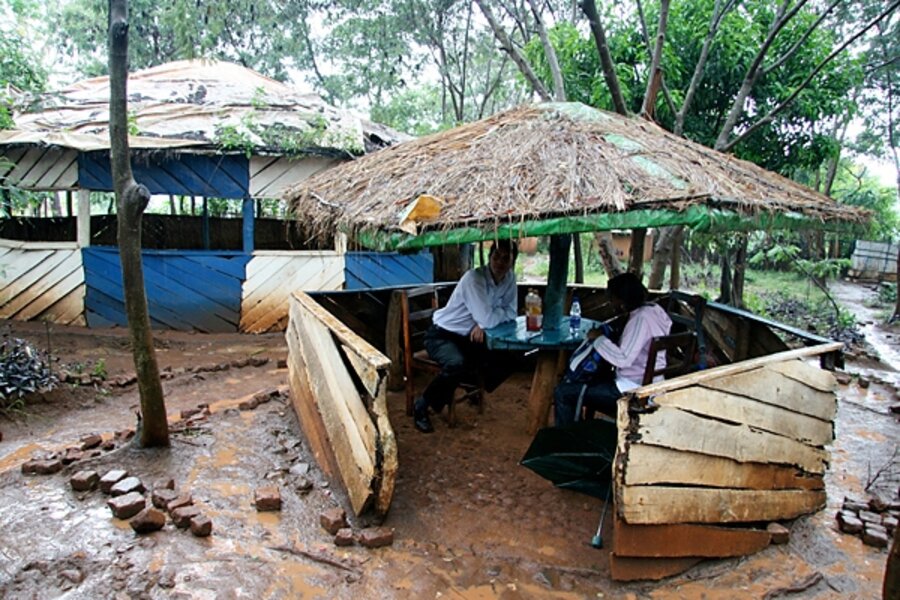They got her goat at ‘The Sheraton’
Loading...
After a week and a half in Tanzania, I fancied myself something of a connoisseur of goat-on-a-stick. Neema and I had lunched at a series of what seemed to me such marginal establishments- and I'd not only survived, but enjoyed, the plates of dubious meat and sodden fries - that I was starting to get a little cocky. Then, I visited The Sheraton.
From the moment I arrived in Mtabila refugee camp - in Kasulu, northwestern Tanzania, not far from the spot on Lake Tanganyika where explorer and "journalist" Henry Morton Stanley is supposed to have said "Dr.Livingstone, I presume?" - I'd been hearing about this place. UN workers and camp volunteers were always off to lunch at the Sheraton, or meeting at the Sheraton.The idea that a swanky international hotel chain would have established an outpost in this squalid camp of 40,000 refugees seemed outlandish. But what did I know? The whole refugee world is so topsy-turvy it's hard to be sure of anything. I guessed it was possible some mad hotel baron had taken a shine to Mtabila, and decided to introduce a little fine dining amid the misery.
My second day there, I found out. Between interviews, the UN workers I was with suggested a lunch break there. We descended from our Land Cruiser in the rain, outside a sopping wet fence, and passed a grill
where half a dozen men were charring the peels of boiled bananas. Filling the center of the grill were skewers of greenish whorls of meat - made somehow more suspect by the fact that they wouldn't let me photograph them. As we passed through the entryway, I scanned my phrasebook for the words "Anything but that."
So it was only once inside that I got a proper took in the Sheraton. The scene was this: an outdoor enclosure dotted with round, thatch-roofed picnic tables, surrounded by a series of kitchen-like stalls in which
live chickens loitered and pots steamed. The paths between the picnic huts were mud. Nobody seemed sure the origin of the place's name - whether it was ironic, or aspirational - but it was an institution in Mtabila, one of the few things that hadn't been shut down as the camp prepared to close.
My companions took charge of the ordering plates of something called "mishkaki," which they translated "barbecue" - in this case, goat.
This made sense. Safari-minded friends had been asking if I'd see any animals in Tanzania, and this had led me to imagine I might naturally cross paths with some exotic creatures. But so far, I'd seen only the ubiquitous
chickens, an occasional dog, one pack of mean, stringy cats, and goats. They were everywhere in Mtabila, drinking from ditches and bleating plaintively and being switched along the roads by tiny boys.It figured that they would be lunch. But I hoped against hope that they weren't the skewers we'd seen in the entryway- which had looked more like seafood, or worse. Our lunch soon arrived, brought over by an extremely polite man in mud-caked rubber boots and a filthy jacket: boiled bananas, gritty fries, and our mishkaki. Cooked, it looked not unlike lunches I'd had with Neema. I bit down optimistically.
"Meat" was really a misnomer. The stick was studded with bits of what could most generously be described as grilled goat gristle, charred and almost impenetrable by the human tooth. I choked down as much as I could, but it was by far the most revolting thing I've ever eaten, and it blew my favorable impression of goat out of the water. In fact, it was like no goat I'd ever tasted.
When my mother called that evening, I mentioned it. Along the way, I'd been telling her about the Tanzanian "wildlife." She had a different take on lunch: "I don't think that was goat. I think it was cat."
"But there were no cats in that camp," I protested.
"Right," she said.
Travel for this project's Africa reporting was funded in part by a grant from The Pulitzer Center on Crisis Reporting


